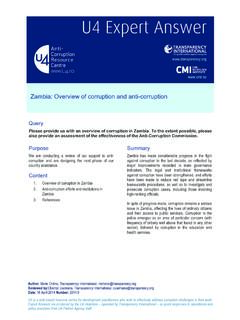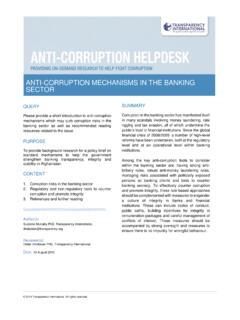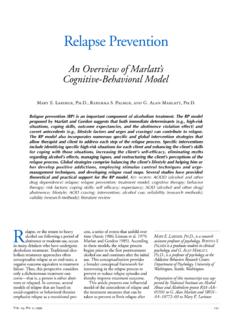Transcription of The impact of corruption on growth and inequality
1 THE impact OF corruption ON growth AND. inequality . QUERY SUMMARY. Could you please provide me with counter- While there is a large consensus in the literature on arguments, evidence as well as possible case the negative impact of corruption on economic studies, which refute the value of corruption as a growth , some researchers continue to argue that positive economic force? the effect of corruption on growth is context specific and associated with factors such as the country's PURPOSE legal and institutional framework, quality of Some development professionals argue that governance and political regime. They conclude corruption can have a positive effect by generating that, in some highly regulated countries that do not parallel and neutral economic flows. Beyond the have effective government institutions and argument that corruption is necessary to "grease governance systems, corruption can compensate the wheels" of the economy, they see corruption as for red tape and institutional weaknesses and a "positive" (economically, socially) and grease the wheels of the economy.
2 "redistributive" force. We would like to have the counter-arguments. This argument does not stand up to scrutiny when looking at the long-term corrosive impact of CONTENT corruption on economic growth , equality and the 1. corruption has a corrosive impact on growth quality of a country's governance and institutional and business operations environment. Evidence indicates that corruption is 2. corruption affects inequality and income likely to adversely affect long-term economic growth distribution through its impact on investment, taxation, public expenditures and human development. corruption 3. corruption affects the overall governance and is also likely to undermine the regulatory business environment environment and the efficiency of state institutions 4. References as rent-seeking distorts incentives and decision- making processes. \\\\\\\\\\\\\\\\\\\\\\\\\\\\\\\\\\\\\\\\ \\\\\\\\\\\\\\\\\\\\\\\\\\\\\\\\\\\\\\.
3 Author(s) Not only does corruption affect economic Marie Ch ne, Transparency International, development in terms of economic efficiency and growth , it also affects equitable distribution of Reviewer(s) resources across the population, increasing income Robin Hodess, PhD, Transparency International inequalities, undermining the effectiveness of social welfare programmes and ultimately resulting in Date lower levels of human development. This, in turn, Responded: 15 March 2014 may undermine long-term sustainable development, economic growth and equality. 2014 Transparency International. All rights reserved. This document should not be considered as representative of the Commission or Transparency International's official position. Neither the European Commission, Transparency International nor any person acting on behalf of the Commission is responsible for the use which might be made of the following information.
4 This Anti- corruption Helpdesk is operated by Transparency International and funded by the European Union. THE impact OF corruption ON growth AND inequality . 1 corruption HAS A CORROSIVE the wheels hypothesis under conditions of impact ON growth AND excessive regulations, it does not necessarily BUSINESS OPERATIONS increase economic growth (Dreher and Gassebner 2011). Many studies have focussed on establishing whether corruption adversely affects economic More generally, there is a large body of evidence growth or whether it can have a positive impact by that indicates that while corruption may help to greasing the wheels of the economy. reduce the costs induced by cumbersome administrative processes in some contexts in the While there is a broad consensus that corruption short term, it has a long-term detrimental effect on has a negative impact on economic growth and the operations of companies and a corrosive impact development (see below), some researchers on a country's overall governance environment, continue to argue that corruption may be eroding the efficiency and legitimacy of state economically justified as it provides opportunities to institutions, and ultimately undermining sustainable bypass inefficient regulations and red tape, and development and the rule of law.
5 Allows the private sector to correct government failures and inefficiency. As such, it could potentially corruption as an obstacle to economic growth promote economic growth by removing bureaucratic At the macro level, the literature generally shows barriers to entry and lowering companies' that corruption has a negative, direct impact on transaction costs when trying to comply with economic growth and development. corruption also excessive regulations. M on and Sekkat provide a has an indirect effect on a country's economic good overview of the proponents and opponents of performance by affecting many factors fuelling such a hypothesis (M on and Sekkat 2005). economic growth such as investment, taxation, level, composition and effectiveness of public Some studies have also argued that the detrimental expenditure. impact of corruption on growth may be context specific and associated with factors such as the Economists have long identified a number of country's legal and institutional framework, quality of channels through which corruption may affect governance, political regime, etc.
6 For example, a economic growth (Mauro 1995; Tanzi 1997; Gupta few studies suggest that while corruption is 2000; Gyimah-Brempong 2001, among others): consistently detrimental in countries where institutions are effective, it can potentially increase corruption distorts incentives and market productivity and entrepreneurship in highly forces, leading to misallocation of resources. regulated countries that do not have effective corruption diverts talent and resources, government institutions and governance systems including human resources, towards lucrative . (Houston 2007; M on and Weill 2008). Other rent-seeking activities, such as defence, rather studies further suggest that the impact of corruption than productive activities. on growth and development may also be regime corruption acts as an inefficient tax on specific and that the type of political regime is an business, ultimately raising production costs important determinant in the relationship between and reducing the profitability of investments.
7 corruption and economic growth (M ndez and corruption may also decrease the productivity Sep lveda 2006). of investments by reducing the quality of resources. For example, by undermining the Responding to this argument, some studies argue quality and quantity of health and education that rather than promoting economic growth , services, corruption decreases a country's corruption can mitigate the impact of weak human capital. institutional and regulatory frameworks. For example, a 2011 paper suggests that corruption Rent-seeking behaviour is also likely to create increases firm entry rate in the presence of inefficiencies, fuelling waste of resources and administrative barriers to entry. However, the paper undermining the efficiency of public concludes that while corruption can counteract the expenditure. effect of over-regulation and supports the grease 2. THE impact OF corruption ON growth AND inequality .
8 corruption is negatively correlated with defence projects. Mauro finds that government economic growth spending on education as a ratio to GDP is negatively and significantly correlated with Macro level studies, using country-level data to corruption in a cross-section of countries (Mauro explore cross-country variations in both governance 1998). Similarly, Tanzi and Davoodi have identified and economic indicators, have consistently found four channels through which corruption affects that corruption significantly decreases economic economic growth , including 1. higher public growth and development. investments 2. lower government revenues 3. lower For example, cross-country data indicate that expenditures on other categories of public corruption is consistently correlated with lower spending, such as health and education 4. lower growth rates, GDP per capita, economic equality, as quality of public infrastructure (Tanzi and Davoodi well as lower levels of human development 1997).
9 (Rothstein and Holmberg 2011). In addition, some researchers have provided Similarly, a 2011 systematic review of available empirical evidence that corruption lowers capital evidence of the effect of corruption on economic productivity and constitutes an important element of growth confirms that corruption has a direct and investors' decision-making processes. According to negative effect on growth in low income countries Lambsdorff's findings, an increase in corruption by (Ugur and Dasgupta 2011). According to the one point on a scale from 0 (highly corrupt) to 10. analysis, corruption also has indirect effects through (highly clean) is found to lower productivity by 4 per transmission channels such as investment, human cent of GDP and decrease net annual capital capital and public finance/expenditure. While the inflows by per cent of GDP (Lambsdorff 2003). direct and indirect effects of corruption on growth hold true for all countries under scrutiny, the review The impact of corruption on levels of investment suggests that they can be mitigated by contextual holds true for foreign direct investment (FDI), as factors such as the level of development and the reflected in a 2010 paper summarising the state of overall quality of governance, with the effect of research on corruption and FDI (Zurawicki and corruption expected to be more detrimental for Habib 2010).
10 Wei (2000a, 2000b, 2001) also finds countries with higher levels of per capita income corruption to be a significant factor in reducing FDI. and institutional quality. in the host country. A 2008 study, looking at US FDI. outflows in relation to levels of corruption in 42 host corruption affects the quantity, quality, cost countries, also indicates that US firms are less likely and profitability of investment to invest in countries where corruption is widespread (Sanyal and Samanta 2008). Consistent Many studies have established that corruption with these findings, other studies have confirmed discourages investment and acts as an additional FDI to be positively correlated with governance cost of doing business, reducing the profitability of indicators such as rule of law, control of corruption , investment projects. regulatory quality, etc (Gani 2007). Firstly, empirical evidence suggests that corruption corruption is also perceived to increase the costs of reduces the ratio of investment to GDP, lowers investment.














